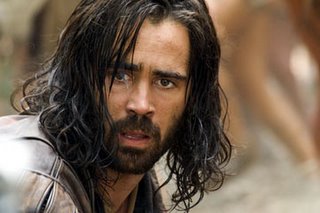Loyalty, Part Two

THE NEW WORLD. With Colin Farrell, Q’Orianka Kilcher, Christian Bale. Director: Terrence Malick (2:30). PG-13: Intense battle scenes. At Lincoln Square.
Terrence Malick's "The New World" is a lush, angry movie about how America got its seat-of-the-pants start.
It shows the good, the bad and the ugly of the interactions between the settlers at Jamestown and the Native Americans who sealed their own fate by lending those settlers a hand.
This is a sublimely rewarding yet prickly movie, anchored by the steady, hypnotic gaze of part-Peruvian, part-Swiss newcomer Q'Orianka Kilcher, who was 14 when she made this. Her luminous, ethnic looks transcend her role as the Powhatan princess Pocahontas to the point where she seems to embody the wild beauty and purity of the land itself - at least the land as it was before it gave rise to concrete, billboards and fast-food joints.
Revisionist history lesson gives way to romance. "The New World" can stand alone as a powerful, intimate love story - an impossible love, to be sure, but that's the most romantic kind.
Colin Farrell plays Capt. John Smith as a swashbuckling adventurer whose lust for new worlds (and women) to conquer was well served by his era. Kilcher is a wise, unspoiled Pocahontas, whose childlike joy and fierce intellect are an irresistible combination.
In reality, Smith and Pocahontas probably didn't hook up like that, despite Disney's animated version and a deeply ingrained collective fantasy. Some of "The New World" is deeply faithful to history (it was filmed around Jamestown, where the settlers landed), while some of it takes poetic license to get at greater truths.
In the end, it's a sweeping, important film that overturns everything you learned in school about the birth of this nation.
When the members of the Powhatan tribe first come across the clueless British settlers (who would have starved without agriculture lessons), they neither rattle spears nor attempt the kind of stilted negotiation movies usually depict. Instead, they swarm over the settlers, sniffing, touching, poking. They're curious and alarmed, territorial yet playful.
If tree-huggers gave Oscars, "The New World" would be a shoo-in. When Pocahontas travels to England to meet the queen (after she's married to another settler, the steadfast tobacco farmer John Rolfe, played with a different but no less effective romantic vibe by Christian Bale), we see the pruned hedges and landscaped gardens through her astonished eyes. Nature can be trussed up magnificently to appear safe and manageable, but implicit in Pocahontas' gaze is all that civilization has traded away in pursuit of progress.
Malick is a writer-director of extraordinary vision who is like an endangered species. Sightings of him are rare. "The New World" is only his fourth movie in 32 years, and it's up there with "Days of Heaven" in terms of ravishing visuals and a story that bundles the fate of its powerfully conflicted characters with that of the land they vainly try to tame.
Even if Smith and Pocahontas didn't take a tumble in the maize, historically speaking, they represent two complicated cultures that were fascinated with and terrified by each other, and whose inevitable mingling was their legacy to the America we inherited.
Originally published on December 23, 2005
Whatever he is, it seems that Colin puts his heart into his trade and we are there for him.


Comments